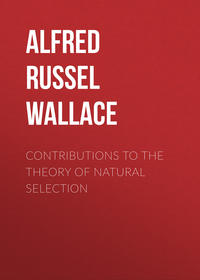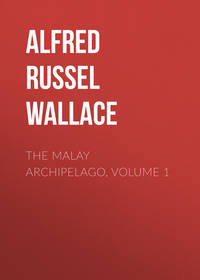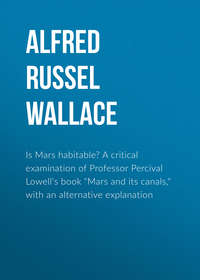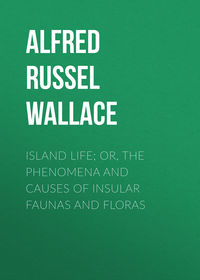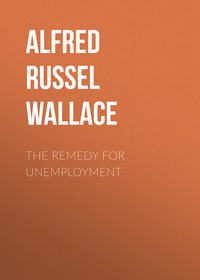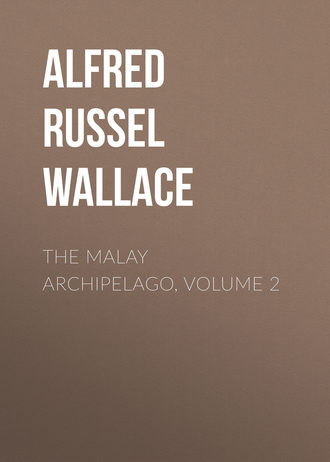 полная версия
полная версияThe Malay Archipelago, Volume 2
Feb 5th.—I took advantage of a very fine calm day to pay a visit to the island of Wokan, which is about a mile from us, and forms part of the "canna busar," or mainland of Aru. This is a large island, extending from north to south about a hundred miles, but so low in many parts as to be intersected by several creeks, which run completely through it, offering a passage for good-sized vessels. On the west side, where we are, there are only a few outlying islands, of which ours (Wamma) is the principal; but on the east coast are a great number of islands, extending some miles beyond the mainland, and forming the "blakang tang," or "back country," of the traders, being the principal seat of the pearl, tripang, and tortoiseshell fisheries. To the mainland many of the birds and animals of the country are altogether confined; the Birds of paradise, the black cockatoo, the great brush-turkey, and the cassowary, are none of them found on Wamma or any of the detached islands. I did not, however, expect in this excursion to see any decided difference in the forest or its productions, and was therefore agreeably surprised. The beach was overhung with the drooping branches of lame trees, loaded with Orchideae, ferns, and other epiphytal plants. In the forest there was more variety, some parts being dry, and with trees of a lower growth, while in others there were some of the most beautiful palms I have ever seen, with a perfectly straight, smooth, slender stem, a hundred feet high, and a crown of handsome drooping leaves. But the greatest novelty and most striking feature to my eyes were the tree-ferns, which, after seven years spent in the tropics, I now saw in perfection for the first time. All I had hitherto met with were slender species, not more than twelve feet high, and they gave not the least idea of the supreme beauty of trees bearing their elegant heads of fronds more than thirty feet in the air, like those which were plentifully scattered about this forest. There is nothing in tropical vegetation so perfectly beautiful.
My boys shot five sorts of birds, none of which we had obtained during a month's shooting in Wamma. Two were very pretty flycatchers, already known from New Guinea; one of them (Monarcha chrysomela), of brilliant black and bright orange colours, is by some authors considered to be the most beautiful of all flycatchers; the other is pure white and velvety black, with a broad fleshy ring round the eye of are azure blue colour; it is named the "spectacled flycatcher" (Monarcha telescopthalma), and was first found in New Guinea, along with the other, by the French naturalists during the voyage of the discovery-ship Coquille.
Feb. 18th.—Before leaving Macassar, I had written to the Governor of Amboyna requesting him to assist me with the native chiefs of Aru. I now received by a vessel which had arrived from Amboyna a very polite answer informing me that orders had been sent to give me every assistance that I might require; and I was just congratulating myself on being at length able to get a boat and men to go to the mainland and explore the interior, when a sudden check came in the form of a piratical incursion. A small prau arrived which had been attacked by pirates and had a man wounded. They were said to have five boats, but more were expected to be behind and the traders were all in consternation, fearing that their small vessels sent trading to the "blakang tana" would be plundered. The Aru natives were of course dreadfully alarmed, as these marauders attack their villages, burn and murder, and carry away women and children for slaves. Not a man will stir from his village for some time, and I must remain still a prisoner in Dobbo. The Governor of Amboyna, out of pure kindness, has told the chiefs that they are to be responsible for my safety, so that they have au excellent excuse for refusing to stir.
Several praus went out in search of the pirates, sentinels were appointed, and watch-fires lighted on the beach to guard against the possibility of a night attack, though it was hardly thought they would be bold enough to attempt to plunder Dobbo. The next day the praus returned, and we had positive information that these scourges of the Eastern seas were really among us. One of Herr Warzbergen's small praus also arrived in a sad plight. It had been attacked six days before, just as it was returning, from the "blakang tana." The crew escaped in their small boat and hid in the jungle, while the pirates came up and plundered the vessel. They took away everything but the cargo of mother-of-pearl shell, which was too bulky for them. All the clothes and boxes of the men, and the sails and cordage of the prau, were cleared off. They had four large war boats, and fired a volley of musketry as they came up, and sent off their small boats to the attack. After they had left, our men observed from their concealment that three had stayed behind with a small boat; and being driven to desperation by the sight of the plundering, one brave fellow swam off armed only with his parang, or chopping-knife, and coming on them unawares made a desperate attack, killing one and wounding the other two, receiving himself numbers of slight wounds, and then swimming off again when almost exhausted. Two other prams were also plundered, and the crew of one of them murdered to a man. They are said to be Sooloo pirates, but have Bugis among them. On their way here they have devastated one of the small islands east of Ceram. It is now eleven years since they have visited Aru, and by thus making their attacks at long and uncertain intervals the alarm dies away, and they find a population for the most part unarmed and unsuspicious of danger. None of the small trading vessels now carry arms, though they did so for a year or two after the last attack, which was just the time when there was the least occasion for it. A week later one of the smaller pirate boats was captured in the "blakang tana." Seven men were killed and three taken prisoners. The larger vessels have been often seen but cannot be caught, as they have very strong crews, and can always escape by rowing out to sea in the eye of the wind, returning at night. They will thus remain among the innumerable islands and channels, till the change of the monsoon enables them to sail westward.
March 9th.-For four or five days we have had a continual gale of wind, with occasional gusts of great fury, which seem as if they would send Dobbo into the sea. Rain accompanies it almost every alternate hour, so that it is not a pleasant time. During such weather I can do little, but am busy getting ready a boat I have purchased, for an excursion into the interior. There is immense difficulty about men, but I believe the "Orang-kaya," or head man of Wamma, will accompany me to see that I don't run into danger.
Having become quite an old inhabitant of Dobbo, I will endeavour to sketch the sights and sounds that pervade it, and the manners and customs of its inhabitants. The place is now pretty full, and the streets present a far more cheerful aspect than when we first arrived. Every house is a store, where the natives barter their produce for what they are most in need of. Knives, choppers, swords, guns, tobacco, gambier, plates, basins, handkerchiefs, sarongs, calicoes, and arrack, are the principal articles wanted by the natives; but some of the stores contain also tea, coffee, sugar, wine, biscuits, &c., for the supply of the traders; and others are full of fancy goods, china ornaments, looking-glasses, razors, umbrellas, pipes, and purses, which take the fancy of the wealthier natives. Every fine day mats are spread before the doors and the tripang is put out to dry, as well as sugar, salt, biscuit, tea, cloths, and other things that get injured by an excessively moist atmosphere. In the morning and evening, spruce Chinamen stroll about or chat at each other's doors, in blue trousers, white jacket, and a queue into which red silk is plaited till it reaches almost to their heels. An old Bugis hadji regularly takes an evening stroll in all the dignity of flowing green silk robe and gay turban, followed by two small boys carrying his sirih and betel boxes.
In every vacant space new houses are being built, and all sorts of odd little cooking-sheds are erected against the old ones, while in some out-of-the-way corners, massive log pigsties are tenanted by growing porkers; for how can the Chinamen exist six months without one feast of pig?
Here and there are stalls where bananas are sold, and every morning two little boys go about with trays of sweet rice and crated cocoa-nut, fried fish, or fried plantains; and whichever it may be, they have but one cry, and that is "Chocolat-t—t!" This must be a Spanish or Portuguese cry, handed down for centuries, while its meaning has been lost. The Bugis sailors, while hoisting the main sail, cry out, "Vela a vela,—vela, vela, vela!" repeated in an everlasting chorus. As "vela" is Portuguese a sail, I supposed I had discovered the origin of this, but I found afterwards they used the same cry when heaving anchor, and often chanted it to "hela," which is so much an universal expression of exertion and hard breathing that it is most probably a mere interjectional cry.
I daresay there are now near five hundred people in Dobbo of various races, all met in this remote corner of the East, as they express it, "to look for their fortune;" to get money any way they can. They are most of them people who have the very worst reputation for honesty as well as every other form of morality,—Chinese, Bugis, Ceramese, and half-caste Javanese, with a sprinkling of half-wild Papuans from Timor, Babber, and other islands, yet all goes on as yet very quietly. This motley, ignorant, bloodthirsty, thievish population live here without the shadow of a government, with no police, no courts, and no lawyers; yet they do not cut each other's throats, do not plunder each other day and night, do not fall into the anarchy such a state of things might be supposed to lead to. It is very extraordinary! It puts strange thoughts into one's head about the mountain-load of government under which people exist in Europe, and suggests the idea that we may be over-governed. Think of the hundred Acts of Parliament annually enacted to prevent us, the people of England, from cutting each other's throats, or from doing to our neighbour as we would not be done by. Think of the thousands of lawyers and barristers whose whole lives are spent in telling us what the hundred Acts of Parliament mean, and one would be led to infer that if Dobbo has too little law England has too much.
Here we may behold in its simplest form the genius of Commerce at the work of Civilization. Trade is the magic that keeps all at peace, and unites these discordant elements into a well-behaved community. All are traders, and know that peace and order are essential to successful trade, and thus a public opinion is created which puts down all lawlessness. Often in former year, when strolling along the Campong Glam in Singapore, I have thought how wild and ferocious the Bugis sailors looked, and how little should like to trust myself among them. But now I find them to be very decent, well-behaved fellows; I walk daily unarmed in the jungle, where I meet them continually; I sleep in a palm-leaf hut, which any one may enter, with as little fear and as little danger of thieves or murder as if I were under the protection of the Metropolitan police. It is true the Dutch influence is felt here. The islands are nominally under the government of the Moluccas, which the native chiefs acknowledge; and in most years a commissioner arrives from Amboyna, who makes the tour of the islands, hears complaints, settle disputes, and carries away prisoner any heinous offender. This year he is not expected to come, as no orders have yet been received to prepare for him; so the people of Dobbo will probably be left to their own devices. One day a man was caught in the act of stealing a piece of iron from Herr Warzbergen's house, which he had entered by making a hole through the thatch wall. In the evening the chief traders of the place, Bugis and Chinese, assembled, the offender was tried and found guilty, and sentenced to receive twenty lashes on the spot. They were given with a small rattan in the middle of the street, not very severely, the executioner appeared to sympathise a little with the culprit. The disgrace seemed to be thought as much of as the pain; for though any amount of clever cheating is thought rather meritorious than otherwise, open robbery and housebreaking meet with universal reprobation.
CHAPTER XXXI. THE ARU ISLANDS.—JOURNEY AND RESIDENCE IN THE INTERIOR
(MARCH TO MAY 1857.)MY boat was at length ready, and having obtained two men besides my own servants, after an enormous amount of talk and trouble, we left Dobbo on the morning of March 13th, for the mainland of Aru. By noon we reached the mouth of a small river or creek, which we ascended, winding among mangrove, swamps, with here and there a glimpse of dry land. In two hours we reached a house, or rather small shed, of the most miserable description, which our steersman, the "Orang-kaya" of Wamma, said was the place we were to stay at, and where he had assured me we could get every kind of bird and beast to be found in Aru. The shed was occupied by about a dozen men, women, and children; two cooking fires were burning in it, and there seemed little prospect of my obtaining any accommodation. I however deferred inquiry till I had seen the neighbouring forest, and immediately started off with two men, net, and guns, along a path at the back of the house. In an hour's walk I saw enough to make me determine to give the place a trial, and on my return, finding the "Orang-kaya" was in a strong fever-fit and unable to do anything, I entered into negotiations with the owner of the house for the use of a slip at one end of it about five feet wide, for a week, and agreed to pay as rent one "parang," or chopping-knife. I then immediately got my boxes and bedding out of the boat, hung up a shelf for my bird-skins and insects, and got all ready for work next morning. My own boys slept in the boat to guard the remainder of my property; a cooking place sheltered by a few mats was arranged under a tree close by, and I felt that degree of satisfaction and enjoyment which I always experience when, after much trouble and delay, I am on the point of beginning work in a new locality.
One of my first objects was to inquire for the people who are accustomed to shoot the Paradise birds. They lived at some distance in the jungle, and a man was sent to call them. When they arrived, we had a talk by means of the "Orang-kaya" as interpreter, and they said they thought they could get some. They explained that they shoot the birds with a bow and arrow, the arrow having a conical wooden cap fitted to the end as large as a teacup, so as to kill the bird by the violence of the blow without making any wound or shedding any blood. The trees frequented by the birds are very lofty; it is therefore necessary to erect a small leafy covering or hut among the branches, to which the hunter mounts before daylight in the morning and remains the whole day, and whenever a bird alights they are almost sure of securing it. (See Frontispiece.) They returned to their homes the same evening, and I never saw anything more of them, owing, as I afterwards found, to its being too early to obtain birds in good plumage.
The first two or three days of our stay here were very wet, and I obtained but few insects or birds, but at length, when I was beginning to despair, my boy Baderoon returned one day with a specimen which repaid me for months of delay and expectation. It was a small bird a little less than a thrush. The greater part of its plumage was of an intense cinnabar red, with a gloss as of spun glass. On the head the feathers became short and velvety, and shaded into rich orange. Beneath, from the breast downwards, was pure white, with the softness and gloss of silk, and across the breast a band of deep metallic green separated this colour from the red of the throat. Above each eye was a round spot of the same metallic green; the bill was yellow, and the feet and legs were of a fine cobalt óille, strikingly contrasting with all the other parts of the body. Merely in arrangement of colours and texture of plumage this little bird was a gem of the first water, yet there comprised only half its strange beauty. Springing from each side of the breast, and ordinarily lying concealed under the wings, were little tufts of greyish feathers about two inches long, and each terminated by a broad band of intense emerald green. These plumes can be raised at the will of the bird, and spread out into a pair of elegant fans when the wings are elevated. But this is not the only ornament. The two middle feathers of the tail are in the form of slender wires about five inches long, and which diverge in a beautiful double curve. About half an inch of the end of this wire is webbed on the outer side only, awe coloured of a fine metallic green, and being curled spirally inwards form a pair of elegant glittering buttons, hanging five inches below the body, and the same distance apart. These two ornaments, the breast fans and the spiral tipped tail wires, are altogether unique, not occurring on any other species of the eight thousand different birds that are known to exist upon the earth; and, combined with the most exquisite beauty of plumage, render this one of the most perfectly lovely of the many lovely productions of nature. My transports of admiration and delight quite amused my Aru hosts, who saw nothing more in the "Burong raja" than we do in the robin of the goldfinch.
Thus one of my objects in coming to the far fast was accomplished. I had obtained a specimen of the King Bird of Paradise (Paradisea regia), which had been described by Linnaeus from skins preserved in a mutilated state by the natives. I knew how few Europeans had ever beheld the perfect little organism I now gazed upon, and how very imperfectly it was still known in Europe. The emotions excited in the minds of a naturalist, who has long desired to see the actual thing which he has hitherto known only by description, drawing, or badly-preserved external covering—especially when that thing is of surpassing rarity and beauty, require the poetic faculty fully to express them. The remote island in which I found myself situated, in an almost unvisited sea, far from the tracks of merchant fleets and navies; the wild luxuriant tropical forest, which stretched far away on every side; the rude uncultured savages who gathered round me,—all had their influence in determining the emotions with which I gazed upon this "thing of beauty." I thought of the long ages of the past, during which the successive generations of this little creature had run their course—year by year being born, and living and dying amid these dark and gloomy woods, with no intelligent eye to gaze upon their loveliness; to all appearance such a wanton waste of beauty. Such ideas excite a feeling of melancholy. It seems sad, that on the one hand such exquisite creatures should live out their lives and exhibit their charms only in these wild inhospitable regions, doomed for ages yet to come to hopeless barbarism; while on the other hand, should civilized man ever reach these distant lands, and bring moral, intellectual, and physical light into the recesses of these virgin forests, we may be sure that he will so disturb the nicely-balanced relations of organic and inorganic nature as to cause the disappearance, and finally the extinction, of these very beings whose wonderful structure and beauty he alone is fitted to appreciate and enjoy. This consideration must surely tell us that all living things were not made for man. Many of them have no relation to him. The cycle of their existence has gone on independently of his, and is disturbed or broken by every advance in man's intellectual development; and their happiness and enjoyment, their loves and hates, their struggles for existence, their vigorous life and early death, would seem to be immediately related to their own well-being and perpetuation alone, limited only by the equal well-being and perpetuation of the numberless other organisms with which each is more or less intimately connected.
After the first king-bird was obtained, I went with my men into the forest, and we were not only rewarded with another in equally perfect plumage, but I was enabled to see a little of the habits of both it and the larger species. It frequents the lower trees of the less dense forests: and is very active, flying strongly with a whirring sound, and continually hopping or flying from branch to branch. It eats hard stone-bearing fruits as large as a gooseberry, and often flutters its wings after the manner of the South American manakins, at which time it elevates and expands the beautiful fans with which its breast is adorned. The natives of Aru call it "Goby-goby."
One day I get under a tree where a number of the Great Paradise birds were assembled, but they were high up in the thickest of the foliage, and flying and jumping about so continually that I could get no good view of them. At length I shot one, but it was a young specimen, and was entirely of a rich chocolate-brown colour, without either the metallic green throat or yellow plumes of the full-grown bird. All that I had yet seen resembled this, and the natives told me that it would be about two months before any would be found in full plumage. I still hoped, therefore, to get some. Their voice is most extraordinary. At early morn, before the sun has risen, we hear a loud cry of "Wawk-wawk-wawk, wók-wók-wók," which resounds through the forest, changing its direction continually. This is the Great Bird of Paradise going to seek his breakfast. Others soon follow his example; lories and parroquets cry shrilly, cockatoos scream, king-hunters croak and bark, and the various smaller birds chirp and whistle their morning song. As I lie listening to these interesting sounds, I realize my position as the first European who has ever lived for months together in the Aru islands, a place which I had hoped rather than expected ever to visit. I think how many besides my self have longed to reach these almost fairy realms, and to see with their own eyes the many wonderful and beautiful things which I am daily encountering. But now Ali and Baderoon are up and getting ready their guns and ammunition, and little Brio has his fire lighted and is boiling my coffee, and I remember that I had a black cockatoo brought in late last night, which I must skin immediately, and so I jump up and begin my day's work very happily.
This cockatoo is the first I have seen, and is a great prize. It has a rather small and weak body, long weak legs, large wings, and an enormously developed head, ornamented with a magnificent crest, and armed with a sharp-pointed hoofed bill of immense size and strength. The plumage is entirely black, but has all over it the curious powdery white secretion characteristic of cockatoo. The cheeks are bare, and of an intense blood-red colour. Instead of the harsh scream of the white cockatoos, its voice is a somewhat plaintive whistle. The tongue is a curious organ, being a slender fleshy cylinder of a deep red colour, terminated by a horny black plate, furrowed across and somewhat prehensile. The whole tongue has a considerable extensile power. I will here relate something of the habits of this bird, with which I have since become acquainted. It frequents the lower parts of the forest, and is seen singly, or at most two or three together. It flies slowly and noiselessly, and may be killed by a comparatively slight wound. It eats various fruits and seeds, but seems more particularly attached to the kernel of the kanary-nut, which grows on a lofty forest tree (Canarium commune), abundant in the islands where this bird is found; and the manner in which it gets at these seeds shows a correlation of structure and habits, which would point out the "kanary" as its special food. The shell of this nut is so excessively hard that only a heavy hammer will crack it; it is somewhat triangular, and the outside is quite smooth. The manner in which the bird opens these nuts is very curious. Taking one endways in its bill and keeping it firm by a pressure of the tongue, it cuts a transverse notch by a lateral sawing motion of the sharp-edged lower mandible. This done, it takes hold of the nut with its foot, and biting off a piece of leaf retains it in the deep notch of the upper mandible, and again seizing the nut, which is prevented from slipping by the elastic tissue of the leaf, fixes the edge of the lower mandible in the notch, and by a powerful nip breaks of a piece of the shell, again taking the nut in its claws, it inserts the very long and sharp point of the bill and picks out the kernel, which is seized hold of, morsel by morsel, by the extensible tongue. Thus every detail of form and structure in the extraordinary bill of this bird seems to have its use, and we may easily conceive that the black cockatoos have maintained themselves in competition with their more active and more numerous white allies, by their power of existing on a kind of food which no other bird is able to extract from its stony shell. The species is the Microglossum aterrimum of naturalists.




